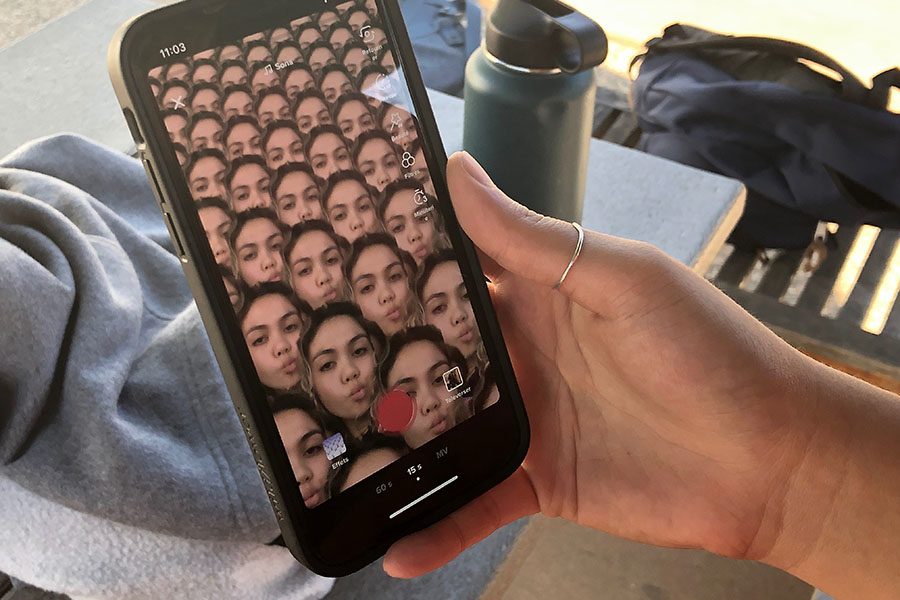Insert title. For postmodernism article. Read article. Comedy. Ironyyy. Cynicism. Hopelessness :o but hopefulness. And more!
Grace Kelley ’20 claims she uses this TikTok effect ironically, but is that so? Has she been unknowingly influenced by postmodernism to be ashamed of her genuine love for this filter, pretending to make fun of it?
I’m scrolling through Instagram and I come upon the longest caption I’ve ever seen. Some Insta baddie has just poured her heart out over the state of the world, a paragraph of sheer vulnerability as she grapples with the violent issues of today. She is utterly upset. Climate change! Racism??? Homophobia!$! Puppies aren’t being adopted? Billie Eilish isn’t gay?! Please please please somebody do something!
But I scoff. And I scroll.
Wait, why am I so cynical? I swear this is not my fault. I’m just a product of my environment. My entire generation has been programmed to be critical of vulnerability. Cynicism is our dominant cultural lens, the lens through which young people see the world.
But let’s not get too depressing. Sure, the content we consume on YouTube, on TikTok, on Twitter, on Tumblr, on Netflix has conditioned us to be extremely jaded, but there is some hope for us. I’ll get to that later, but first I’m going to get real pretentious as I attempt to explain postmodernism. This philosophical term is referred to as “the cultural logic of late capitalism,” which describes the absurd pandemonium that is the current state of contemporary society (thank you, Fredrick Jameson).
Postmodernism is disgusted by ideals from the “modern era.” Oh, you think we can explain nature with science and religion? This world is defined by chaos only. So, if you are conscious, you must be depressed. But how do we respond to the meaningless cultural wasteland that is our modern world? We’ve got one tool at our disposal: we combat hypocrisy and stupidity with irony. Irony is a verbal expression of our struggle with all the meaninglessness and tomfoolery around us.
Postmodern scholars…(please excuse all this italicizing; it’s my attempt at expressing an ironic tone through my writing, which is kinda meta because I’m showing how much postmodernism is infiltrating my daily thoughts)…did not subscribe to being naive believers in anything.
In postmodernism’s atmosphere of chaos and overexposure, people are extremely critical of themselves and everything around them. Here’s an example: some girl walks by with a Hydro Flask and a scrunchie and many people’s immediate instinct is to roll their eyes, witnessing such a cliché in live-action. Ugh, this basic VSCO girl is so predictable, it makes me want to puke.
Congrats, guys. You are such insightful social commentators! Making fun of and criticizing literally anything that is genuine makes you better than everyone. You win! Point postmodernism.
But C.S. Lewis said, “You can’t go on ‘seeing through’ things forever. The whole point of seeing through something is to see something through it. To ‘see through’ all things is the same as not to see.” This ironic disdain for sincerity and omnipresent pessimism that’s so familiar to Gen Z can be psychologically debilitating, and it just doesn’t work at a certain point. David Foster Wallace worried that irony can be “corrosive to the soul.”
Let’s take the show “It’s Always Sunny in Philadelphia.” The characters are terrible past the point of redemption, and the show is cynical and ironic just to be cynical and ironic. Every episode is another instance of “The Gang” being sociopathic in their apathy for others, being controlled by their own selfish desires and never learning from their mistakes. Dee and Dennis take up literal crack to try to get free health insurance, Frank often alludes to the sweatshop he owns in Vietnam, Mac kills his dog and feeds it to Dennis, the entire Gang kidnaps an immigrant family and destroys its home…I can go on.
This sitcom’s ironic approach critiques the overly sincere, cheesy and easily consumable nature of shows like “The Brady Bunch” and “Full House.” But look, “It’s Always Sunny” may be absolutely hilarious, but it is hopeless.
Postmodern pessimism defines Gen Z’s humor. For example, TikTok. This app is a beautiful trash dump of fantastically cynical comedy videos. Everyone on there is making fun of and criticizing something about our culture to the point where it gets extremely meta and you cannot tell who is serious and who is self-aware and what the heck are we even making fun of anymore? I’m confused. Why are we singing about STDs? At what point did we start laughing about mass genocide? Postmodernism.
But Gen Z humor is not all STD jokes. There’s hope for us. I think what is impressive and refreshing about our generation is that while being critical about the world, we still find meaning in it.
Metamodernism is a system of thought that balances between “enthusiasm and a postmodern irony, between hope and melancholy, between naïveté and knowingness, empathy and apathy, unity and plurality, totality and fragmentation, purity and ambiguity,” according to Vermeulen in “Notes of Metamodernism.”
We acknowledge reality’s complete lack of meaning, but we choose to confront our problems for the sake of rebuilding happiness instead of basking in despair like characters on a postmodern sitcom. We cannot express vulnerability in 600-word college essays without making fun of ourselves, yet we have this optimism about the world and value sincerity. We deeply and genuinely care about our future, and ultimately we do the best we can to ensure progress through activism, even though are plagued with an intense skepticism about our own naive worldviews. We make meta judgments about everything to vocalize our struggle with meaninglessness — everything is Maya — but there is ultimately hope.
Everyone goes crazy for “The Office,” and on that show, instead of cynicism for cynicism’s sake, the characters are unabashedly genuine and yearn for meaning. Sure, Michael makes inappropriate comments, has sexual misconduct reports for days and is a terrible boss. He puts his employees through hell, but the characters and viewers still seem to love him. The show is self-referential and ironic, but it’s also hopeful, because it displays earnest human connection beyond the ridiculous happenings within the office walls.
So, there is a shift happening from pure non-redemptive pessimism in art to something greater and more meaningful (side note: look up Bo Burnham). Although I find dark and nihilistic comedies to be highly entertaining, their pessimism is not sustainable or helpful. I wonder how shows in the future will approach a balance between irony and sincerity, for more meaning and connection beyond just negativity for negativity’s sake.
I myself am struggling with my own cynicism and hope to move away from my instant disdain for sincerity. I don’t want to immediately invalidate my feelings whenever I express anything vulnerable. Self-awareness is suffocating, and being overly critical and sarcastic does not make you superior, Julia. Maybe it’s a generational thing. Maybe it’s a me problem. Maybe my cynicism and humor are so intrinsic to my core identity that I shouldn’t even bother self-reflecting or changing. I don’t know. But what I do know is that I haven’t lost hope. I know there is meaning in this world amidst its meaninglessness, and maybe I am apart of a metamodern artistic movement that embraces this dichotomy in real-time.

Julia Yellen, a senior at Flintridge Sacred Heart, is new to the Veritas Shield as a staff writer this year but has written freelance for the paper in...

